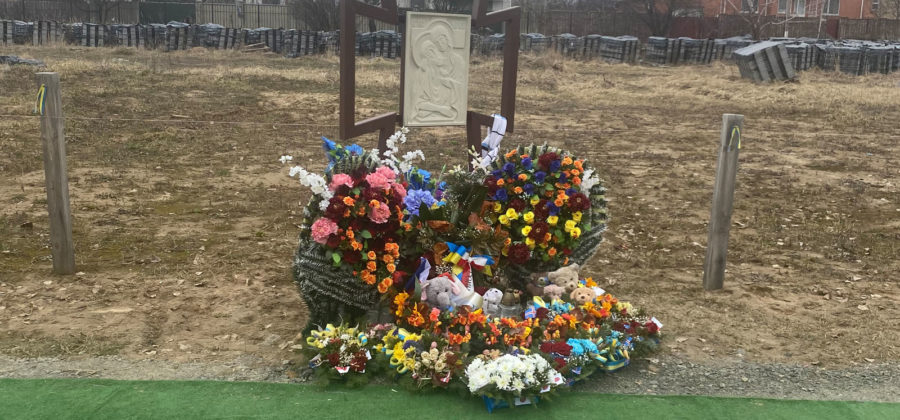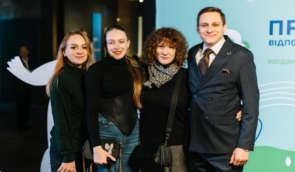Hard Truths Facing Those Collecting War Crimes Evidence in Ukraine
Four hundred days into Russia’s large-scale invasion of Ukraine there’s no shortage of ideas or recommendations on how crimes committed in the context of the war should be prosecuted.
 Image credit: Dr Brian Dooley. The flowers are the memorial in the church grounds of St Andrew’s in Bucha on the site of mass graves.
Image credit: Dr Brian Dooley. The flowers are the memorial in the church grounds of St Andrew’s in Bucha on the site of mass graves.National Ukrainian courts are prosecuting suspects, while the International Criminal Court has issued arrest warrants for Russia’s Vladimir Putin, and its children’s rights commissioner, Maria Lvova-Belova, for war crimes involving the forcible transfer and deportation of Ukrainian children. There is also talk of a special international tribunal, or a hybrid version of that, and some European countries have opened domestic criminal investigations.
Prosecutions aside, suspects could also be hit with the Magnitsky Sanctions – United States government sanctions that ban those targeted from entering the US and freezing their US-based assets by the US, and similar punishments by other countries.
Whatever the accountability mechanisms, they will all require evidence, and that’s the hard part. The difficulties facing local human rights groups collecting such evidence are enormous.
I’ve been coming to Ukraine to work with local activists collecting and analysing evidence of war crimes for nine years, since Russia’s first invasion of 2014. The challenges confronting them until early 2022 were serious enough. It largely fell to local human rights experts in Ukraine to educate their authorities on how to properly process the evidence they were giving them, how to run efficient investigations, and how to undertake credible prosecutions.
But over the last 13 months that workload has become crushing. This is the sixth research visit I’ve made to Ukraine for Human Rights First since February last year, and I’ve seen some of the enormous difficulties confronting my activist colleagues here now.
Their everyday realities include severe fatigue and stress. They are, after all, doing their work while the war is still on, often in dangerous places. Air raid alarms have constantly interrupted their sleep and ability to move around for over a year. Many are likely to be suffering from sleep deprivation or disruption and primary and/or secondary trauma. There is severe pressure on them not to criticise their own authorities lest they be seen as disloyal to the war effort. Much of Ukraine’s criminal justice system is antiquated, requiring evidence they gather digitally to be submitted in hard copy.
The pressures on their personal life are often incredibly tough – many have relatives and friends fighting in the military. Others are helping their own families who are now trying to cope as refugees in Europe and elsewhere. Almost no Ukrainian men aged 18-60 are allowed to leave the country, so it is now virtually always the responsibility of women activists to make the long treks out of the country (there are no planes in or out of Ukraine, and Warsaw is a 17-hour train ride from Kyiv) to undertake international advocacy trips.
Then there is simply the scale of crimes and the amount of material to sift through. Ukraine’s Office of the Prosecutor General encourages people to collect and send it evidence of war crimes, and estimates Russia has already committed at least 65,000 war crimes so far. But by last month, only 26 war crime suspects had reportedly been charged and convicted by Ukraine’s national court system.
Truth Hounds, the Ukrainian NGO with the most experience in collecting evidence of war crimes, only has a couple of dozen staff. It also encourages people to send in evidence of possible war crimes, and has produced a short guide on how to film and take pictures of crime scenes. Official advice from authorities to people in Russian-occupied territories is if possible they “Record violations of human rights …. But do it only if it is safe! Secretly record violations and share evidence with the Ukrainian and international community.”
The crisis has meant it’s all hands on deck to document war crimes – activists who prior to February 2022 were focused on other issues, including protecting the environment and anti-corruption, have now joined the effort on gathering evidence.
It’s a big ask for activists to suddenly switch their areas of focus, especially in the middle of a war, but within days of Russia’s large-scale invasion the 5am NGO coalition was formed to co-ordinate those with and without prior war crimes investigation experience to collect and present evidence. And accountability for war crimes is part of the national psyche – it has been a prominent part of human rights work in the country since 2014, and Ukraine’s north eastern city of Kharkiv hosted the first war crime trials of the Second World war in 1943, two years before those at Nuremberg started.
But the challenges are immense. Human rights NGO ZMINA is one of the founding members of the 5am coalition. Its advocacy director, Alena Lunova, says during their research visits around the country they speak to witnesses and survivors “who only then learn that they are victims of war crimes…. Also, people do not believe that this crime will be properly recorded and that the criminals will be brought to justice.”
While the mass mobilisation of the public in gathering photographic and other evidence produces some useful evidence, not all of it is of good enough quality to be used in a court case, but all of it has to be looked at, taking enormous time and resources.
One potentially encouraging piece of news is that in a European Court of Human Rights case about Russian human rights violations in Ukraine, brought by the governments of the Netherlands and Ukraine against Russia, the court has accepted evidence from open source investigations. This could help future prosecutions if this precedent is accepted by Ukrainian courts, or foreign courts also addressing these issues, and widen the base from where evidence can come.
It’s important to remember too that most war crimes are unlikely to end in a conviction or even prosecution. In a study of survivors in Ukraine of conflict-related sexual violence from 2014-2022 conducted by the Global Survivors Fund, Truth Hounds and other local NGOs, prosecution of perpetrators was only one of the priorities cited by the survivors.
The main findings of the study show survivors’ needs also include urgent medical, psychological, and economic support; further acknowledgment of what has been done to them; and a comprehensive state reparations policy.
Future reparations will also likely require some level of evidence, meaning the pressure on local activists to collect, and properly and securely preserve testimonies and other data, will only increase.
Source: Queen’s University Belfast – Article by Dr Brian Dooley
Dr. Brian Dooley is Senior Advisor at Human Rights First, a U.S.- based NGO. He specialises in working with Human Rights Defenders (HRDs) in conflict and post-conflict contexts, and was senior advisor to the UN Special Rapporteur on HRDs Mary Lawlor 2020-2023. His most recent work has been in the Hong Kong revolution and on Russia’s war on Ukraine. He has also written two books related to the conflict in Northern Ireland, including a comparative study of the civil rights movements in the U.S. and Northern Ireland.
If you have found a spelling error, please, notify us by selecting that text and pressing Ctrl+Enter.















